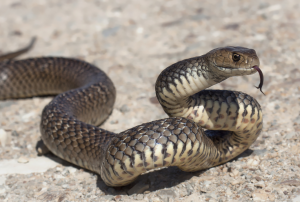Australia is home to many venomous snakes and in the warmer months snakes become much more active. As pet owners we need to be cautious and safeguard our pets. Our canine companions are inquisitive creatures and will often chase or attempt to kill snakes, while our feline friends possess a strong hunting instinct, which makes them susceptible to snake bites.
Envenomation from the toxins contained in snake venom is life-threatening and should always be treated as an emergency. If you do suspect that your pet has come into contact with a snake, it is vital that you immediately seek veterinary attention.
Depending on where you live, some of most common snakes that threaten the lives of our pets here in Australia include the Eastern Brown, the Red-bellied Black, the Taipan and the Tiger Snake. It’s important to note that snakes don’t intentionally seek out our pets, but due the instinctive nature of them both, incidences do occur and the best thing that we can do is be prepared and don’t panic.
If you see a snake in your garden, contact your local licensed snake catcher. They will safely remove and relocate the snake into a safe environment. Identifying a snake can be difficult, so never assume it is non-venomous. Please don’t attempt to catch or approach the snake but if you can safely take a photo or note its colour and markings, this will help your vet and the snake catcher.
Reducing the risk of snake bite
Warmer weather awakens our native snakes and they often seek out water and a food source. They’re not uncommon to see in backyards, around rockeries, on bush trails or even in or around the home. Most snakes will actively avoid you if given the chance. However, if they are threatened or challenged, the risk of them striking and biting is both real and potentially deadly for both human and pet. If you are in a snake area, ensure the grass is kept short, the garden is tidy and avoid shoes being left outside. Avoid walking in long grassy areas and don’t allow your pets to explore holes or dig under rocks, don’t allow your pet to approach a snake even it appears to be dead. Keep dogs on leads or a harness when out walking or on adventures in the bush. Consider snake-proof fencing the yard and remove potential food sources such as rats or mice.
Keep your vet’s emergency contact details and opening hours on hand, ask your regular vet if they stock snake detection kits and snake antivenom. Our Greencross Vets family includes leading emergency vet hospitals across Australia that are well-equipped to treat snake bites. Many locations are open 24 hours a day, 365 days a year. Click here to view our emergency vet locations . Save their details in your phone for future reference.
First Aid Tip for Snake Bites
 This is an *Emergency* situation, transport your pet to a vet immediately.
This is an *Emergency* situation, transport your pet to a vet immediately.
- Pets are usually bitten on or around the head, neck and front legs
- Take note of the colour and patterns on the snake. For a great reference for snake identification see: www.whatsnakeisthat.com.au
- Do not attempt to catch the live snake or harm the snake (snakes are protected and killing them is illegal)
- Don’t waste time chasing the snake, get your pet to the vet safely
- Remain calm and don’t panic. Keeping calm will soothe your pet and help minimise their distress and movement.
- Apply a pressure immobilisation bandage if possible (similar first aid techniques as recommended for people), but do not use a tourniquet or restrict blood flow. Do not try to look for a bite mark or clean the bite site with anything.
- Keep your pet calm and quiet, movement helps the venom spread around the lymphatic system, so the less they move, the more time you have.
- Carry your pet to the car, do not allow your pet to walk if you can help it. Again, any restriction of movement helps.
- Transport your pet to a vet immediately, and if possible, call the clinic to let them know you are on the way. They may also provide additional instructions.
Signs that your pet has been bitten by a snake:
If your pet is in the close vicinity of a snake, assume they may have been bitten
Most of the time a bite mark will not be seen as the snake fangs are razor sharp and leave tiny holes in the skin. The pet may not even feel the bite, and therefore may not yelp in pain. Often dogs may collapse briefly after a snake bite, they may vomit, but then act completely normal again. This indicates they have received a lethal dose of venom. Bleeding is a late sign of envenomation.
Remember, pets can react in different ways.
Symptoms can include:
- Dilated pupils
- Weakness in hind legs
- Trembling
- Drooling
- Pale gums
- Pacing around anxiously
- Restlessness
- Difficulty breathing
- Vomiting
- Panting
- Collapse straight after being bitten, and then act normally for a period of time
- Become comatose / unconscious
- Bleeding from nose, mouth, bite site
- Sudden death
If you have seen a snake in the vicinity of your pet, and are unsure if they have been bitten, it is always better to take them to the vet for an assessment. If caught early, snake bites can be successfully treated. If you have any questions about your pet’s health and wellbeing, your local Greencross Vets team are here to help! Give us a call or book an appointment online today.

 Greencross Vets
Greencross Vets 





